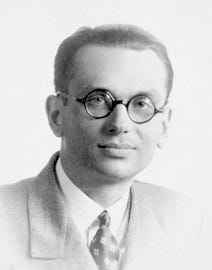Exploring the Limits of Divine Knowledge: A Mathematical Inquiry
Written on
Chapter 1: Understanding God's Algorithm Box
The concept of "God’s Algorithm Box" refers to the hypothetical system through which God arrives at decisions or calculations, ultimately underpinning His omniscience. The characteristics attributed to the Abrahamic God are widely recognized, and for those unfamiliar, they can be reviewed in further detail.
Attributes of God in Christianity - Wikipedia
The traits of God are specific features discussed within Christian theology, outlining the nature and essence of the divine.
In the discussion surrounding free will and divine omniscience, a significant question arises: if God knows the future, does that negate the existence of free will? My perspective is that being all-knowing does not equate to knowing the future. For the sake of this exploration, let’s posit that God possesses complete knowledge of the past and present, but not of future events. This interpretation restores the concept of free will, as God wouldn’t know our future choices.
This understanding alleviates one philosophical dilemma regarding divine knowledge, but a more profound issue remains concerning God's Algorithm Box. Simply put, an algorithm is a defined set of steps to achieve an outcome, so don’t let the term confuse you—it’s a technical expression preferred in specific circles.
Now, let's define what X represents—the input to God’s Algorithm Box. This could be a personal dilemma or a challenge encountered in various academic subjects. Once you input X into the box, the process begins, eventually producing an output, Y.
The output Y is expected to be the optimal solution to the problem presented as X. To clarify, let’s consider a simple example:
If X is "2 + 2," we all agree that the output is 4. Thus, God’s Algorithm Box confirms this calculation. With Y established, we can formulate a mathematical statement:
2 + 2 = 4
This means we can equate the input X with the output Y. In this straightforward scenario, God’s Algorithm Box has effectively generated a correct statement.
You can input various problems into God’s Algorithm Box. For instance, if you want to balance a chemical equation, you simply enter the unbalanced equation, and the box will provide the correct coefficients as the output Y. The same goes for complex physics problems, such as calculating the thermal equilibrium of a drink mixed with alcohol and seltzer. The Algorithm Box can handle such inquiries seamlessly, making it a valuable tool for homework and research alike.
However, not all outputs will align perfectly (X = Y). Sometimes, we might encounter relationships like X ? Y, which can be interpreted as "if X, then Y." Logic teaches us that statements possess truth values; we assign T (true) or F (false) to these statements. For example:
2² = 9
This statement would be categorized as false (F), since two squared equals four, not nine.
Another example involves the Pythagorean Theorem: A² + B² = C² signifies a right triangle. This theorem is well-known, and many recognize its significance in mathematics.
To demonstrate how we derive statements from God’s Algorithm Box, we must note that it extends beyond simple arithmetic. However, a significant revelation awaits us.

Kurt Gödel, a pivotal figure in mathematics, made substantial contributions, notably his two Incompleteness Theorems. His first theorem asserts that in any powerful system capable of expressing arithmetic, there are truths that cannot be resolved within that system. The second theorem posits that such a system cannot demonstrate its own consistency. A brief excerpt from his Wikipedia page explains:
“The first incompleteness theorem states that for any ?-consistent recursive axiomatic system powerful enough to describe the arithmetic of the natural numbers, there exist true propositions about the natural numbers that cannot be proved or disproved from the axioms."
Gödel’s findings imply that statements like 2 + 2 = 4 can sometimes be true, while others cannot be definitively categorized. His insights challenge traditional notions of divine omniscience.
Given that Gödel was a Christian, he may not have fully recognized the implications of his work for the concept of an all-knowing God. Nonetheless, his research undermined the efforts of Russell and Whitehead’s Principia Mathematica project, which aimed to encapsulate all of mathematics. Gödel’s work demonstrated the impossibility of this goal.
Consequently, some statements from God’s Algorithm Box, such as X = Y and X ? Y, may lack definitive truth values. Moreover, according to the second Incompleteness Theorem, we cannot ascertain whether God’s Algorithm Box itself is consistent.
This revelation suggests that God cannot be fully omniscient. Even with the future excluded from God's knowledge, the concept of omniscience remains untenable.
The implications for traditional beliefs about divine knowledge and biblical inerrancy are profound, suggesting that atheism may indeed hold validity, as the existence of God—as traditionally conceived—cannot be substantiated.
While science may not answer every question, it continually strives to expand our understanding. Therefore, consider supporting scientific endeavors rather than religious institutions. Below are some useful links:
Help defend science!
Join the Union of Concerned Scientists to advocate for innovative solutions in science.
Give Now! - Science from Scientists
Support the not-for-profit organization dedicated to promoting scientific understanding.
Scientific Research
Learn about the priorities that guide scientific inquiry.
Ways to Give
Explore options to contribute to scientific advancement.
Please consider subscribing to my publications on Medium and following my work. Your support is greatly appreciated.
Chapter 2: The Complexity of Divine Knowledge
In the video titled "Gods in Boxes: Almighty Algorithms and Hidden Values," the discussion revolves around the intricate relationship between divine knowledge and mathematical principles, offering insights into the limitations of traditional beliefs.
The second video, "GRCC Math Seminar: God's Algorithm: A Simple Solution for the Rubik's Cube," explores the notion of divine problem-solving through the lens of mathematical algorithms, shedding light on the complexities of divine reasoning.